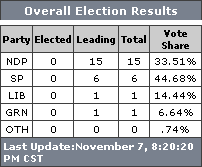I’m pretty sure “red/green” puns have jumped the shark and should now be filed under any headline having to do with Kermit’s observations on how easy being green isn’t, but I’m not going to file a complaint or anything. From today’s Toronto Star:
GREENS SEEING RED
NDP Leader Jack Layton‘s dalliance with the Tories on the issue of Senate reform is raising eyebrows among Green party members.
They wonder what happened to Layton’s insistence in the last election that bringing in proportional representation should be a top priority for the minority Parliament. Proportional representation is a voting system that gives seats in proportion to the parties’ total popular vote across the nation.
But when Harper and Layton talked recently about parliamentary reform, it was the Senate – not proportional representation – that was Layton’s priority. Layton is proposing a national referendum on the future of the Senate and Harper offered his tentative support for the idea.
Yesterday, Layton was in Calgary to “shore up the support of Western Canadians in the NDP’s bid to hold a referendum on the future of the Senate.”
So what about proportional representation?
“Since Parliament can realistically only deal with one democratic reform issue at a time, Mr. Layton’s out-of-nowhere proposal to abolish the Senate is at odds with the NDP’s traditional support for reforming our voting system,” Chris Tindal, the Green party’s democratic reform advocate, said in a statement. “What has happened to his priorities and his promises?”
